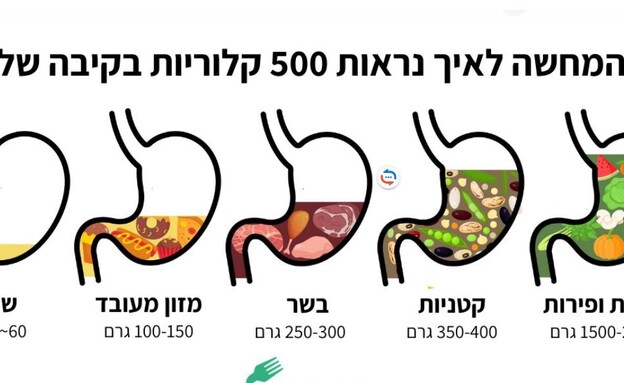feel full without a lot of calories
One of the most prominent benefits of dietary fiber stems from the fact that it can help us maintain a healthy weight, and increasing fiber consumption can help in weight loss processes. There are several reasons for this, the main one being that the fibers actually increase the volume of food we eat and thus contribute to a feeling of satiety. The fibers also slow down the emptying rate of the stomach, that is, help us feel full for longer and eat less.
Maintain a healthy gut
It may not be so pleasant to talk about, but dietary fiber helps to increase the volume of the stool, improve its texture and prevent constipation. why is it important? Because regular bowel movements can say a lot about the health of our intestines and our health in general. There is also evidence that they can remove from the body straight into the toilet carcinogenic substances that we are exposed to through food. In addition, the dietary fiber improves the composition of bacteria (microbiome) in our gut. and make them produce short-chain fatty acids – substances that benefit many systems in the body, the immune system, the liver and even the brain.
Reduce sugar levels and improve fat profile
Anyone who has ever prepared oatmeal has encountered one of the most important properties of dietary fiber – their viscosity, which is actually their ability to create a jelly texture. It turns out that this property is the key to the ability of dietary fiber to help improve blood sugar levels and reduce cholesterol and triglyceride levels in the blood. The viscosity slows down the absorption of sugar from food in the intestine and also the excretion of cholesterol in the feces.
How to eat enough fiber?
The recommended fiber intake for men is 38 grams and for women 25 grams per day. But only one in five Israelis consumes this amount of fiber. One of the reasons for this may be the fear and confusion that some of us have about carbohydrates. It is important to know that whole plant foods that contain a lot of fiber usually also contain carbohydrates and for most of us this is excellent. For example, legumes and whole grains contain a lot of fiber alongside complex carbohydrates, and studies show a beneficial effect of these foods on health in many aspects. There is a very big difference between carbohydrates that are naturally found in whole foods, and carbohydrates that are added sugars found in products such as snacks, candy, breakfast cereals and other processed foods.
It is better to eat whole foods – and not fiber supplements
There are dozens of types of dietary fiber, some of which are also sold in isolated form in pharmacies accompanied by all kinds of promises to improve your health. But these isolated fibers cannot compete with the benefits of the whole (unprocessed) foods that contain dietary fibers of different types, each of which has a different beneficial aspect. Moreover, the whole foods also have additional substances such as: vitamins and antioxidants, the very combination of which gives an even better effect, and thus we gain the health benefits of whole plant foods. Adequate consumption of dietary fiber is one of the main benefits of switching to a diet based on whole plant foods, but it is not the only health benefit of such a diet. In fact, this is the first principle in the nutritional recommendations of the Ministry of Health – that most of the food we consume should be whole plant foods, thanks to the extensive research knowledge that points to the low risk of a variety of chronic diseases in such a dietary pattern.
Bottom line – more fiber is healthier
When it comes to fiber – always think about how to incorporate more of it: more vegetables at each meal, more fruit during the day, another dish that includes legumes instead of or alongside the meat dish, another choice of whole grain instead of white grain – if it’s to switch to whole bread, cook oatmeal Fox or prepare a salad that also contains quinoa or bulgur. More fiber equals more satiety, more stools and more health.
The authors are Kerem Avital and Roni Hasson, dieticians fromOrganization of doctors for nutrition
